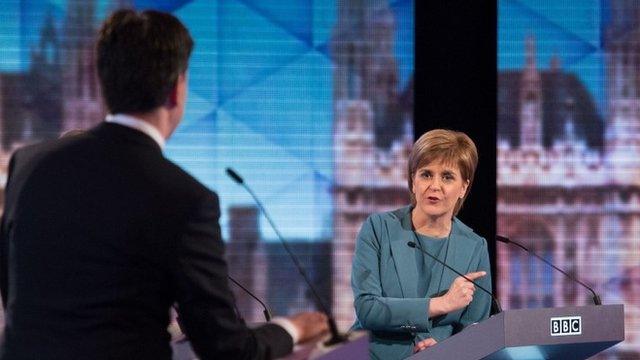Election 2015: SNP row dominates debate fallout
- Published
Ed Miliband sought to distance himself from the SNP during a heated exchange
A row between Labour and the SNP over whether to "work together" in the event of a hung parliament has dominated the debate fallout.
Labour leader Ed Miliband again ruled out a formal coalition with the SNP, saying he would "never compromise" on the issues apparently dividing them.
SNP leader Nicola Sturgeon said people would not forgive him if he turned down the chance to "lock the Tories out".
The Conservatives say a Labour/SNP alliance would be "a ragbag of chaos".
Meanwhile, UKIP leader Nigel Farage has said he did not lose his temper during the debate when he criticised the audience for what he perceived as their left-wing bias.
One-on-one
The political parties were back on the campaign trail on Friday after the previous night's debate, which was hosted by the BBC.
Prime Minister David Cameron has hailed the last unemployment figures before polling day on 7 May, which showed the jobless total fall by 76,000 to 1.84 million in the three months to February, as a "jobs miracle".
The Conservatives have also seized on remarks by International Monetary Fund head Christine Lagarde praising the strength of the UK recovery compared with the rest of the European Union.
Highlights of the BBC election debate in two minutes
Mr Miliband has challenged Mr Cameron to a one-on-one debate in the remaining three weeks of the campaign in the aftermath of Thursday's second and final scheduled multi-party debate, in which the prime minister and Lib Dem leader Nick Clegg did not take part.
"He won't come and debate me. He wants to duck, weave and dive his way back into Downing Street. And if he had guts, he'd come out and he'd accept my challenge to debate me one-on-one, head to head," he said at Labour's youth manifesto launch.
But David Cameron said: "We've had 146 debates at Prime Minister's Questions, and I think people have seen a lot of those, to get the measure of us. But the key thing people saw last night is that Labour can only get into Downing Street with the support of the SNP."
'Work together'
During Thursday's 90-minute encounter - which figures suggest was watched by an audience of about 4.3 million - Mr Miliband, Ms Sturgeon, Green Party leader Natalie Bennett, Mr Farage and Plaid Cymru's Leanne Wood clashed over cuts, the NHS, immigration and defence.
A snap poll taken immediately after the debate suggested that the Labour leader had come out on top.

Analysis, BBC political correspondent Iain Watson
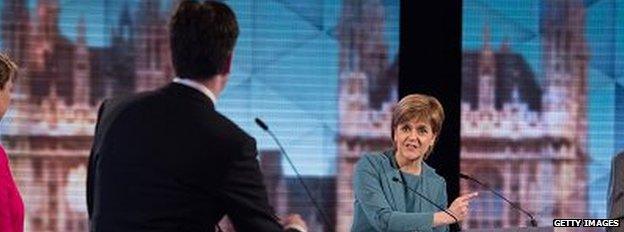
With polls suggesting a hung parliament - and potentially heavy Labour losses to the SNP in Scotland - it was inevitable that Ed Miliband would face questions about any deal he might strike with Nicola Sturgeon's party to keep the Conservatives out of power.
He has for some time ruled out a formal coalition. So has she. So speculation has moved on to whether they could reach an informal arrangement, where the SNP would guarantee a Labour budget in return for concessions.
For a time, Labour used relatively emollient language towards the SNP as it tried to woo former supporters who had voted "yes" in the referendum.
The rhetoric is now more robust, as the polls refuse to budge. But the underlying thinking is much the same.
But the trickier question is what happens if the Conservatives have more seats than Labour - but not a majority - and Ed Miliband could still become prime minister with tacit SNP support?
Constitutionally it would be possible, but politically it could damage Labour's future prospects in England.

In other election news:
Official figures show average earnings rose 1.7% over the three months to February, down from 1.9% over the previous three months.
Labour outlines plans to ban companies from offering unpaid work experience for more than four weeks
UKIP criticises the process for choosing the studio audience for Thursday's debate as the BBC defends the process
Both the Conservatives and UKIP launch their Welsh manifestos
The Ulster Unionists launch their manifesto, after the Northern Ireland parties held their first TV debate
Almost a quarter of British Asians have yet to decide how to vote, research suggests
During Thursday's debate, Mr Miliband dismissed overtures from SNP leader Nicola Sturgeon to "work together" to keep the Conservatives out of power in the event of one party not winning enough seats to form a government on their own.
Opinion polls have suggested the SNP is on course to win a swathe of seats in Scotland and to be in a powerful position in the event of an inconclusive result.
The SNP has ruled out any deal with the Conservatives but said they would be prepared to support Labour on a vote-by-vote basis, with Ms Sturgeon suggesting they could "work together to lock David Cameron out of Downing Street".
Ed Miliband to David Cameron: 'Debate me one on one'
William Hague: "Any of them in any combination would be a coalition of chaos"
Lib Dem's Danny Alexander: Key issue in election is who is holding the balance of power
At Labour's youth manifesto launch in Lincolnshire on Friday, Mr Miliband - who has previously ruled out a formal Labour-SNP coalition - was asked about the prospect of nationalist votes propping up a minority Labour government.
"It's not going to happen," he said, adding: "I will never compromise our national security, I will never compromise our commitment to fiscal responsibility, I will never compromise on the nature of our United Kingdom."
However, Mr Miliband did not explicitly ruled out a looser agreement, known as a confidence and supply agreement, where the SNP could potentially support a Labour government in key parliamentary votes.
Work and Pensions Secretary Iain Duncan Smith predicted that any deal between the two parties would lead to "a ragbag of chaos" with "a weak leader being hauled all over the place by the Scottish nationalists, who ultimately want to break up the United Kingdom."

BBC Political Editor Nick Robinson's view of the debate
David Cameron's absence gave Mr Miliband the chance to taunt the absent prime minister for his lack of political courage.
It also allowed him to focus his fire on the SNP's Nicola Sturgeon, trying to create a distance which he has, so far, struggled to create.
On the other hand... the images of the night, the video clips and the memorable soundbites are all of Ed v Nicola.
Conservative HQ and the Tory press will take delight in using them to conjure up the spectre of a weak minority Labour government being forced to deal with and placate a rampant SNP.

Both Mr Clegg and UKIP's Nigel Farage have also warned about the danger of the SNP holding the balance of power after the next election but Ms Sturgeon has said her party would use its influence to protect the NHS and other "progressive" ideals.
"Ed Miliband knows if there's an anti-Tory majority in the House of Commons after the May election, the only way David Cameron gets back in to Downing Street is if Ed Miliband stands back and lets him back in," Ms Sturgeon said on a campaign visit to Irvine, Ayrshire, on Friday.
"Now if Ed Miliband does that, Labour in Scotland and I suspect in other parts of the UK will never be forgiven," she said.
At one point in Thursday's TV debate, UKIP leader Mr Farage was booed when he complained of what he said was "a remarkable audience even by the left-wing standards of the BBC".
Asked whether he had lost his temper, Mr Farage said he had not, telling the BBC News Channel: "I was very calm about it. I didn't lose my rag."

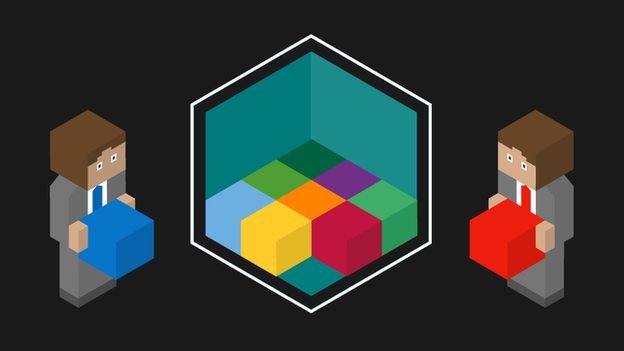
The permutations for a hung Parliament are growing

Mr Farage said his protest had been sparked by the hostile audience reaction to his argument that high levels of immigration were increasing pressure on the housing market, something he said would be accepted by "most rational people".
He said it was a "mistake" for the BBC to give the job of audience selection to polling company ICM, but he stopped short of saying he would lodge a complaint, saying: "I've got an election to fight."
Reacting to Thursday's debate, Green Party leader Natalie Bennett said she was "very pleased", as it provided an opportunity to set out her party's policies.
Asked about her performance, she said some Twitter polls suggested she did "particularly well", adding: "I think what matters is obviously the poll on polling day, and that people heard the Green Party message."
Plaid Cymru's leader, Leanne Wood, said she had achieved her aims in the debate: " I managed to speak for Wales, speak against austerity and convey the set of values that Plaid Cymru holds dear."
On a campaign trip to Aberdeenshire, Lib Dem leader Nick Clegg said he had not watched the debate, but maintained that he would have liked to have taken part, because it lacked "a sensible centre-ground voice - spelling out some of the realities of what we face as a country, and setting out a hopeful vision about how we can finish the job of balancing the books and doing so fairly".
- Published17 April 2015
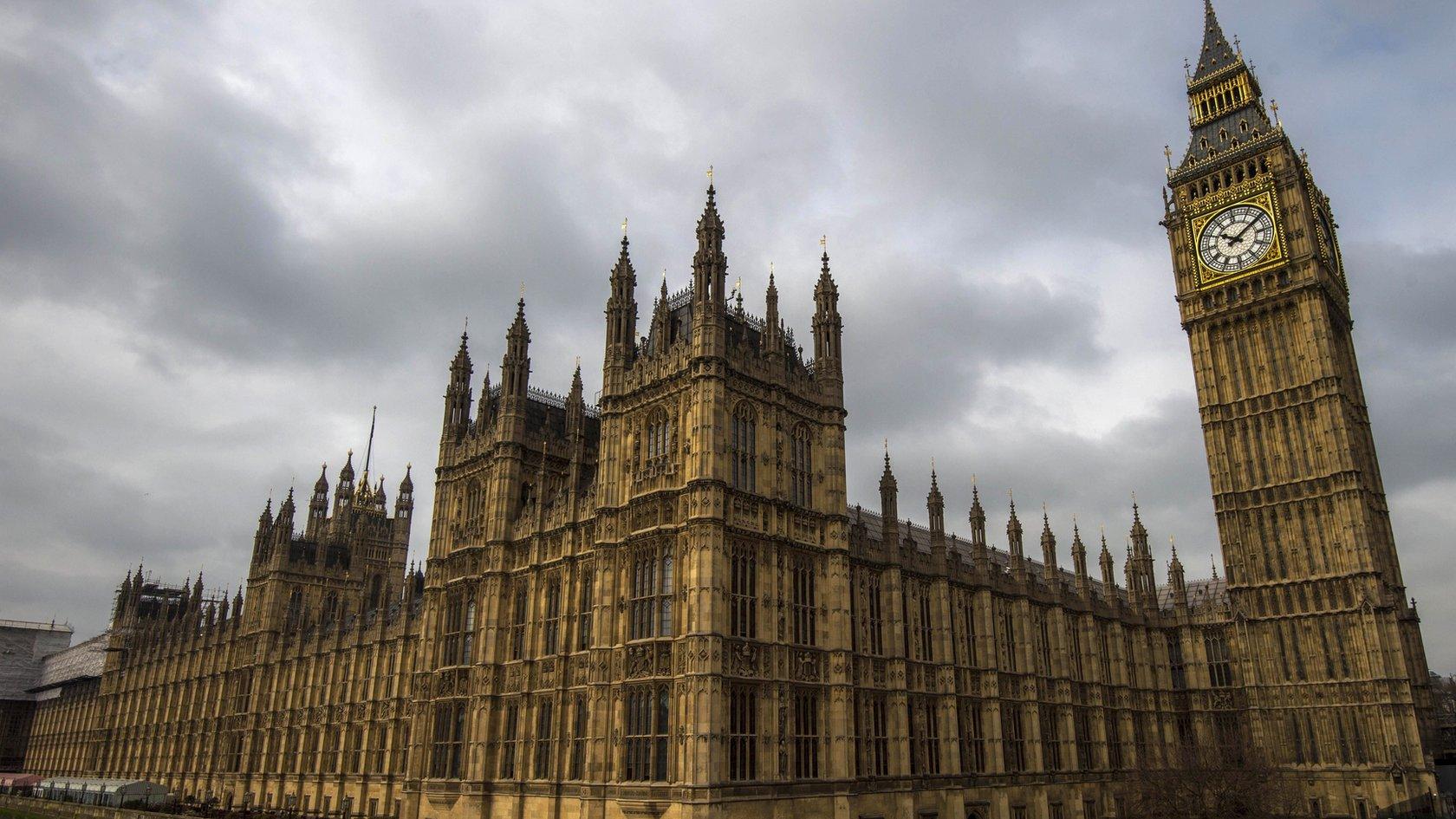
- Published17 April 2015
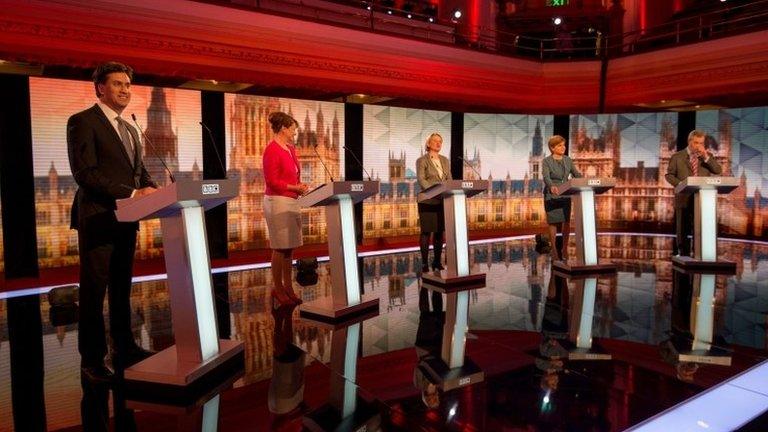
- Published16 April 2015
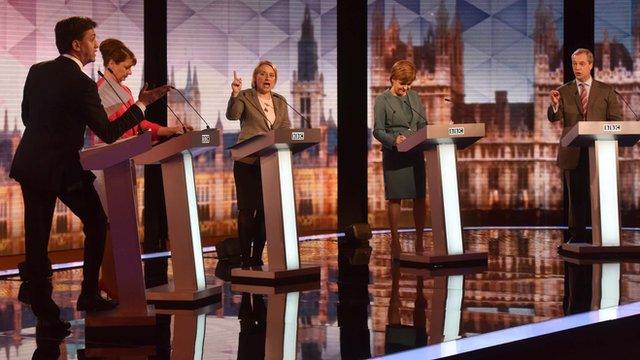
- Published16 April 2015
